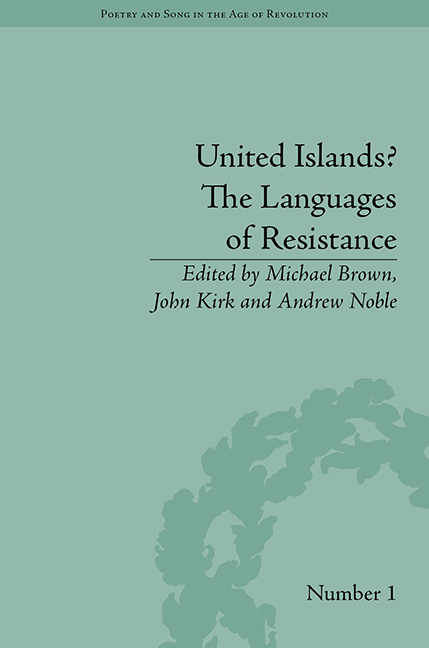Book contents
- Frontmatter
- CONTENTS
- Acknowledgements
- List of Figures and Tables
- List of Contributors
- Introduction: The Languages of Resistance: National Particularities, Universal Aspirations
- 1 Reading the English Political Songs of the 1790s
- 2 Why should the Landlords have the Best Songs? Thomas Spence and the Subversion of Popular Song
- 3 ‘Bard of Liberty’: Iolo Morganwg, Wales and Radical Song
- 4 Canonicity and Radical Evangelicalism: The Case of Thomas Kelly
- 5 Charlotte Brooke's Reliques of Irish Poetry: Eighteenth-Century ‘Irish Song’ and the Politics of Remediation
- 6 Homology, Analogy and the Perception of Irish Radicalism
- 7 Lost Manuscripts and Reactionary Rustling: Was there a Radical Scottish Gaelic Poetry between 1770 and 1820?
- 8 Virile Vernaculars: Radical Sexuality as Social Subversion in Irish Chapbook Verse, 1780–1820
- 9 Thomas Moore and the Problem of Colonial Masculinity in Irish Romanticism
- 10 Radical Politics and Dialect in the British Archipelago
- 11 ‘Theaw Kon Ekspect No Mooar Eawt ov a Pig thin a Grunt’: Searching for the Radical Dialect Voice in Industrial Lancashire and the West Riding, 1798–1819
- Afterword: The Languages of Resistance
- Notes
- Works Cited
- Index
3 - ‘Bard of Liberty’: Iolo Morganwg, Wales and Radical Song
- Frontmatter
- CONTENTS
- Acknowledgements
- List of Figures and Tables
- List of Contributors
- Introduction: The Languages of Resistance: National Particularities, Universal Aspirations
- 1 Reading the English Political Songs of the 1790s
- 2 Why should the Landlords have the Best Songs? Thomas Spence and the Subversion of Popular Song
- 3 ‘Bard of Liberty’: Iolo Morganwg, Wales and Radical Song
- 4 Canonicity and Radical Evangelicalism: The Case of Thomas Kelly
- 5 Charlotte Brooke's Reliques of Irish Poetry: Eighteenth-Century ‘Irish Song’ and the Politics of Remediation
- 6 Homology, Analogy and the Perception of Irish Radicalism
- 7 Lost Manuscripts and Reactionary Rustling: Was there a Radical Scottish Gaelic Poetry between 1770 and 1820?
- 8 Virile Vernaculars: Radical Sexuality as Social Subversion in Irish Chapbook Verse, 1780–1820
- 9 Thomas Moore and the Problem of Colonial Masculinity in Irish Romanticism
- 10 Radical Politics and Dialect in the British Archipelago
- 11 ‘Theaw Kon Ekspect No Mooar Eawt ov a Pig thin a Grunt’: Searching for the Radical Dialect Voice in Industrial Lancashire and the West Riding, 1798–1819
- Afterword: The Languages of Resistance
- Notes
- Works Cited
- Index
Summary
On 4 February 1795 the Welsh stonemason Edward Williams, better known as Iolo Morganwg (‘Iolo from Glamorgan’), celebrated the acquittals of Thomas Hardy, John Horne Tooke and John Thelwall at the Crown and Anchor Tavern with a song. Trial by Jury, subsequently printed as a broadside, comprises four heady stanzas of ‘Triumph's exulting excess’: mountains of innocence standing firm against the raging storms, spies and informers helplessly gnashing their fangs. In the final stanza, as homage is paid to the defendants’ lawyers, the glorious institution of Trial by Jury is claimed for Britain.
Boast, BRITAIN, thy JURIES! thy glory! thy plan!
They treat the stern Tyrant with scorn!
O! bid them descend, the best Guardians of Man,
To millions of ages unborn,
Far and wide as the light, of true FREEDOM the soul
Be thy BLEST INSTITUTION proclaim'd;
With ERSKINE, with GIBBS, on Eternity's roll
In the language of Glory be nam'd.
This is not untypical. On the printed page, all brash capital letters, italics and exclamations, Iolo does tend to assert more than he persuades. But a good voice can work magic, even on bombast, and this is, or rather was, a performance. In front of an audience of some 900 people, Iolo Morganwg became at this point most fully, and most publicly, the character for which he was best known in radical and literary circles in 1790s London, ‘Bard Williams’, or, as he put it himself in the rather wittier ‘Newgate Stanzas’, the ‘Bard of Liberty’:
Of late, as at the close of day
To Newgate cells I bent my way
Where Truth is held in thrall.
I, 'twas to scorn a Tyrant's claim,
Wrote Bard of Liberty my name
And terror seized them all.
- Type
- Chapter
- Information
- United Islands?The Languages of Resistance, pp. 63 - 76Publisher: Pickering & ChattoFirst published in: 2014

